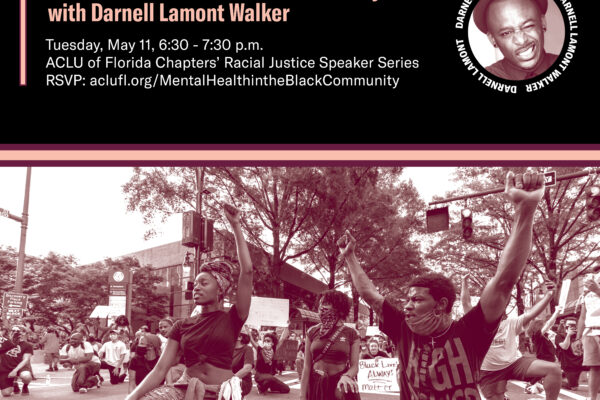More than 30 years ago, a small group of cooperating attorneys with the ACLU of Florida’s Greater Miami Chapter sued the City of Miami on behalf of some 6,500 people experiencing homelessness to prohibit the city from arresting and harassing them, and destroying their property. The ACLU lawsuit resulted in a decree prohibiting the city from violating the constitutional rights of the plaintiffs based on their homeless status. In October, a panel of judges at the Eleventh Circuit Court of Appeals affirmed Federal District Judge Federico Moreno’s 2018 termination of the 20-year Pottinger Consent Decree. We will now watch to see whether the city has indeed instituted “durable” reforms to counter what the courts found to be a policy and practice of mistreatment.
In 1992, following weeks of testimony by individuals who were homeless, as well as experts on police procedures, public health officials and city administrators, Federal District Judge C. Clyde Atkins entered his landmark judgment ruling that the city had systematically violated the plaintiffs’ Fourth, Fifth, Eighth, and Fourteenth Amendment rights based on their homeless status.
The city appealed, based in part on its claim that it had changed its ways. It now had programs to assist those struggling with homelessness and contributed to the Miami-Dade Homeless Trust, which administered assistance programs and built a shelter to house some of the people in need. Following an additional hearing, Judge Atkins lauded the city’s and county’s efforts but ruled that so long as any people experiencing homelessness on the streets of Miami were still subject to arrest and property destruction based on their homeless status, the court’s judgment must stand.
Upon the city’s further appeal, the Eleventh Circuit Court of Appeals ordered the parties to mediate and, if possible, resolve their dispute. Following some 20 months of intensive negotiations, the parties entered a settlement agreement that was adopted by the district court in 1998 and became the Pottinger Consent Decree. The decree broadly required the city to respect the constitutional rights of the plaintiffs. It established a protocol that police were required to follow before arresting plaintiffs for “life-sustaining misdemeanor conduct,” offenses that people experiencing homelessness necessarily committed by virtue of their homelessness.
Those included sleeping in a park after curfew, trespassing on public property, and limited public nudity (by virtue of a lack of restrooms available to them). The protocol entailed first warning individuals who were homeless to stop any offending conduct and offering them available shelter. The decree also required the city to train its police on how to respect people experiencing homelessness, follow city-wide procedures for handling personal property found in public, keep records of their encounters, and compensate those individuals whose rights had been violated.
For some 20 years, with minor modifications negotiated by the parties in 2014, the Pottinger Decree kept the city in check and protected the property rights and freedom of movement of individuals experiencing homelessness. It has served as a nationwide model for protecting our neighbors in need.
In 2018, following a series of city “clean-up” operations directed at homeless encampments that were deemed public health threats, the city moved to terminate the decree. Simultaneously,
based on the city’s summary seizure and destruction of property during these operations, and city police and workers’ orders that the individuals experiencing homelessness leave these encampments and other areas and not return, plaintiffs moved to enforce the decree and hold the city in contempt.
Following a seven-day evidentiary hearing, Judge Moreno terminated the consent decree and denied the plaintiffs’ request for enforcement and contempt. The court found that the city was justified in destroying the plaintiffs’ personal belongings because they were “commingled” with contaminated property, and that orders to “move on” were necessary to facilitate clean-up operations. Ultimately, the court ruled that the city had “substantially complied” with the terms of the decree and had implemented “durable” reforms in its treatment of people experiencing homelessness, such that federal district court oversight was no longer necessary.
The ACLU appealed the district court’s ruling. On Oct. 1, a panel of the Eleventh Circuit Court of Appeals affirmed Judge Moreno’s termination of the decree.
The district court’s ruling and appellate court’s affirmance were based on a finding that the City of Miami had fundamentally changed its way of dealing with homelessness and no longer needed to be policed. For instance, independent of the decree, the city adopted a police departmental order that incorporated many of the elements of the decree. The courts presumed that the city would continue to respect the rights of individuals struggling with homelessness as identified in Judge Atkins 1992 judgment. They presumed that the city would strive, through the Miami-Dade Homeless Trust and other programs, to secure housing for all homeless in Miami and ensure the “continuum of care” necessary to provide a path back to sheltered society. Both courts reminded the city that if it returned to its former ways, those experiencing homelessness were free to seek further injunctive or compensatory relief through civil rights actions.
The ACLU expects the city to abide by its pledge of durable reforms. This is particularly essential amid the COVID-19 pandemic. The Centers for Disease Control and Prevention (CDC) have warned against breaking up encampments of this vulnerable population during the crisis. We expect the city to strive to provide its homeless with housing and other assistance. We will continue to monitor the city’s conduct and will not hesitate to return to court if the city fails to keep its word.

